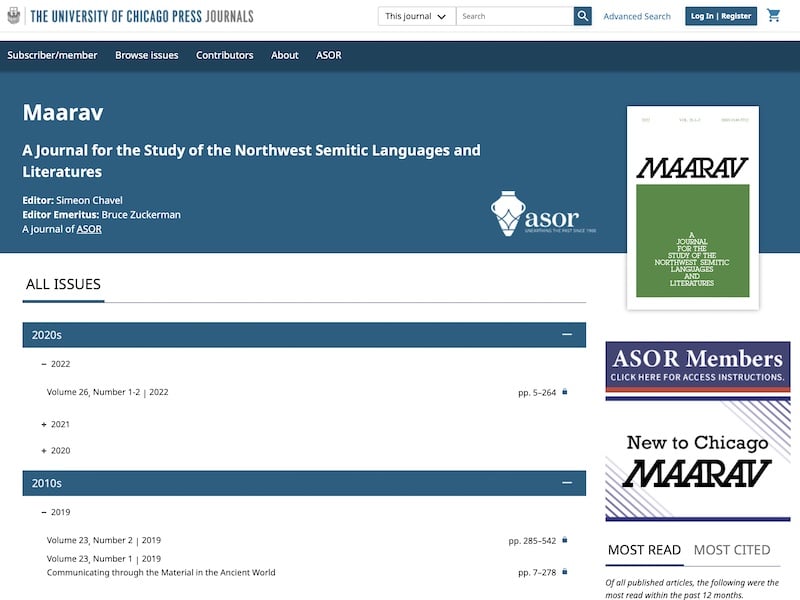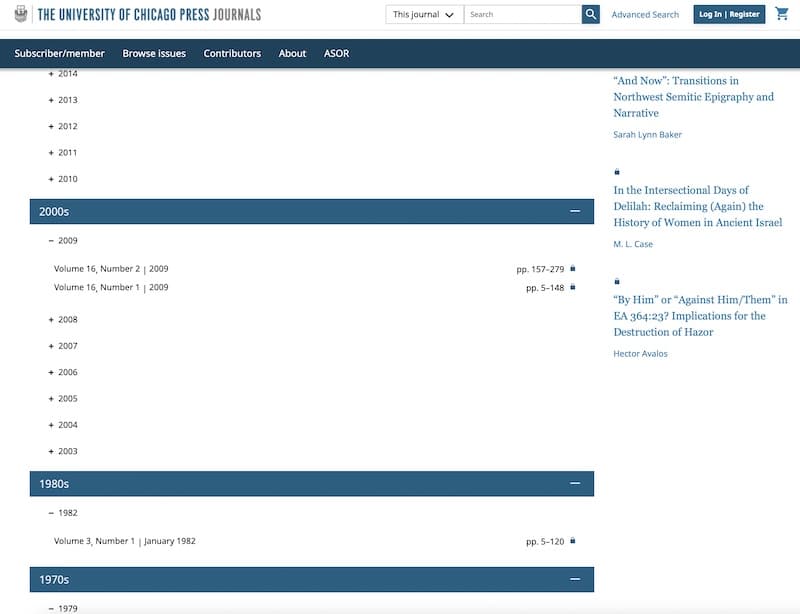
ASOR ANNOUNCES THE ADDITION OF THE JOURNAL, MAARAV
ASOR is pleased to announce that Maarav is now part of the ASOR journal family and is available to ASOR members with online access to all of our journals (NEA, BASOR, and JCS) through the University of Chicago Press platform. Maarav is a journal for the Study of the Northwest Semitic Languages and Literatures with an emphasis on linguistics, philology, and literary studies. This journal is devoted to the texts and verbal objects of the ancient Levant featuring Aramaic, Hebrew, Phoenician, and related languages. In addition to research on their verbal features, Maarav welcomes inquiry into their material, visual, and social aspects, their cultural horizons and relationships, and contemporary interests like the technological developments in decipherment, storage, representation, and analysis and the history and current practices of acquiring and interpreting ancient objects.
Please read the letter from the editor, Simeon Chavel (University of Chicago), below.
Dear Members,
It is an honor to follow Bruce Zuckerman (founder, 1978–2002) and Christopher Rollston (2002–2022) and serve as the third Editor of Maarav. The journal will continue to center on the inscriptions found in the Levant (Syro-Palestine) of the Late Bronze Age, the Iron Age, and the Persian period written in the languages characteristic of the region. At its core will be study of the inscriptions’ material, linguistic, and literary aspects. Around the core will be studies comparing earlier and later inscriptions and literature; comparing literature in Mesopotamia, Anatolia, and the Mediterranean; and reconstructing Levantine societies, culture, and history. Anchored in distinct objects (verbal ones) defined by period and place rather than in tradition (biblical), Maarav sees itself as representing a crucial node and nexus of several overlapping fields of study of the ancient world, and it aims to serve robustly in that capacity.
Select topics illustrating the range are:
- the origins and spread of the alphabetic writing system and its comparison with other systems
- the varied uses of writing
- the genres of writing in general and of literature in particular
- the relationship of writing to art and to place, in immediate, broader, static, and dynamic contexts
- the wealth of religious, mythical, and other speculative lore
- the place of magic in society and in thought
- the significant role of writers (“scribes”)
- regimes of administration and power
- the reach of concepts and practices across many regions and down through time.
Wide-ranging developments make this a promising time for Maarav to thrive—developments in the technologies of deciphering images and of presenting them; in approaches to the material and social worlds of verbal objects; in the analysis of gender and of humanness; in the reconstruction of Levantine societies and ethnicity in their imperial contexts; in the understanding of cultural interaction from Mesopotamia across the Mediterranean; and in the ethics—the politics and the economics—of imperially enabled scholarship today.
Maarav looks to fit in wonderfully at ASOR alongside BASOR, JCS, and NEA, and and is excited to be available to you, their inquisitive and learned readers. It plans to be published semiannually. The board of editors draws on three pools of colleagues: continuing editors, faculty at the University of Chicago, and additional scholars who represent desired areas of expertise and emerging trends. You can see the board, keep up with new issues, and access back-issues here.
Yours,
Simeon Chavel
This journal is only available to active members including Regular with online only access, Regular with both online and print delivery, Retired with online only access, Retired with both online access and print delivery, Sustaining, Early Career, Graduate, and Undergraduate levels. Associate and Contributing members do not have access to Maarav.
Please take a look at the ASOR Maarav publication page here or look at the selection of back issues on the UCP Maarav page here. If you are an ASOR member with access, you will need to be logged into the ASOR Portal here to access this journal. Contact membership@asor.org if you have questions on how to access Maarav.

